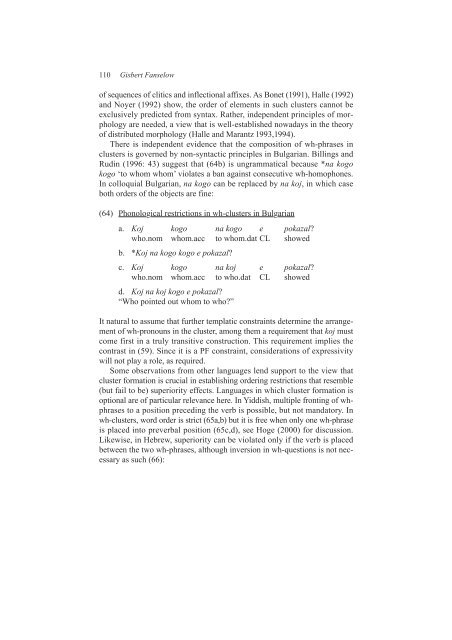Minimality Effects in Syntax · The MLC and Derivational Economy ...
Minimality Effects in Syntax · The MLC and Derivational Economy ...
Minimality Effects in Syntax · The MLC and Derivational Economy ...
You also want an ePaper? Increase the reach of your titles
YUMPU automatically turns print PDFs into web optimized ePapers that Google loves.
110 Gisbert Fanselow<br />
of sequences of clitics <strong>and</strong> <strong>in</strong>flectional affixes. As Bonet (1991), Halle (1992)<br />
<strong>and</strong> Noyer (1992) show, the order of elements <strong>in</strong> such clusters cannot be<br />
exclusively predicted from syntax. Rather, <strong>in</strong>dependent pr<strong>in</strong>ciples of morphology<br />
are needed, a view that is well-established nowadays <strong>in</strong> the theory<br />
of distributed morphology (Halle <strong>and</strong> Marantz 1993,1994).<br />
<strong>The</strong>re is <strong>in</strong>dependent evidence that the composition of wh-phrases <strong>in</strong><br />
clusters is governed by non-syntactic pr<strong>in</strong>ciples <strong>in</strong> Bulgarian. Bill<strong>in</strong>gs <strong>and</strong><br />
Rud<strong>in</strong> (1996: 43) suggest that (64b) is ungrammatical because *na kogo<br />
kogo ‘to whom whom’ violates a ban aga<strong>in</strong>st consecutive wh-homophones.<br />
In colloquial Bulgarian, na kogo can be replaced by na koj, <strong>in</strong> which case<br />
both orders of the objects are f<strong>in</strong>e:<br />
(64) Phonological restrictions <strong>in</strong> wh-clusters <strong>in</strong> Bulgarian<br />
a. Koj kogo na kogo e pokazal?<br />
who.nom whom.acc to whom.dat CL showed<br />
b. *Koj na kogo kogo e pokazal?<br />
c. Koj kogo na koj e pokazal?<br />
who.nom whom.acc to who.dat CL showed<br />
d. Koj na koj kogo e pokazal?<br />
“Who po<strong>in</strong>ted out whom to who?”<br />
It natural to assume that further templatic constra<strong>in</strong>ts determ<strong>in</strong>e the arrangement<br />
of wh-pronouns <strong>in</strong> the cluster, among them a requirement that koj must<br />
come first <strong>in</strong> a truly transitive construction. This requirement implies the<br />
contrast <strong>in</strong> (59). S<strong>in</strong>ce it is a PF constra<strong>in</strong>t, considerations of expressivity<br />
will not play a role, as required.<br />
Some observations from other languages lend support to the view that<br />
cluster formation is crucial <strong>in</strong> establish<strong>in</strong>g order<strong>in</strong>g restrictions that resemble<br />
(but fail to be) superiority effects. Languages <strong>in</strong> which cluster formation is<br />
optional are of particular relevance here. In Yiddish, multiple front<strong>in</strong>g of whphrases<br />
to a position preced<strong>in</strong>g the verb is possible, but not m<strong>and</strong>atory. In<br />
wh-clusters, word order is strict (65a,b) but it is free when only one wh-phrase<br />
is placed <strong>in</strong>to preverbal position (65c,d), see Hoge (2000) for discussion.<br />
Likewise, <strong>in</strong> Hebrew, superiority can be violated only if the verb is placed<br />
between the two wh-phrases, although <strong>in</strong>version <strong>in</strong> wh-questions is not necessary<br />
as such (66):
















